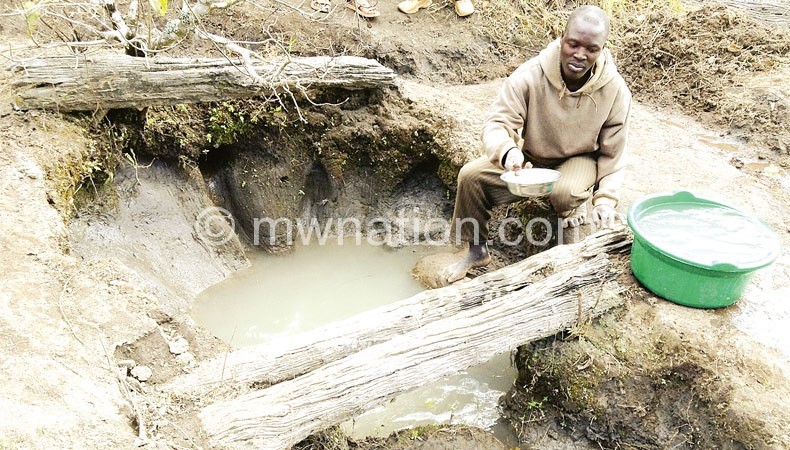Hunting for dirty water

Malawi is doing reasonably well in improving people’s access to clean and safe water, if the 2012 Joint Monitoring Programme (JMP) report by Unicef and the World Health Organisation (WHO) is anything to go by.
The report says 95 percent of the urban population and 80 percent of the rural population have access to safe water, representing an average of 87.5 percent.
JMP is a global data set that is used to track progress on water supply and sanitation. The report says between 1990 and 2010, access to safe water in the country improved from about 47 percent to 83 percent.
At this rate, projections show that by 2015, about 94 percent of the population will have sustainable access to improved water sources. This means Malawi is on course to achieving the Millennium Development Goal (MDG) of halving the proportion of people without sustainable access to safe drinking water and basic sanitation by 2015.
But for people of Mthunzi Village in Traditional Authority (T/A) Chikho’s area in Ntchisi, the rosy figures on access to clean and safe water are a cruel joke. The impoverished area is located 56 kilometres from the Boma.
People in the area have given up on accessing safe water. For over five years since their borehole broke down, they have lived in an area where access to safe water is more than a hustle. To them, life-giving liquid can be sourced from anywhere—wells, streams and rivers.
“We move from one place to another, digging shallow wells or places where we think we can find water underneath. Unfortunately, our dugout wells do not take long to dry up because we are many in this village. When that happens, we then move on to another place. This is the kind of life we live here,” says EphreidaYohane.
The problems that Yohane and other people in the village face are not unique to them. Many other areas across the country are facing similar challenges.
In many rural areas, many people have to walk distances as long as eight kilometres daily in search of water. When they find it, it is usually from an unsafe sources. This makes them vulnerable to waterborne diseases.
It also means that in such areas, there are no rivers to allow for irrigation farming; hence, chances of successful agricultural production are slim.
Group Village Head (GVH) Mthunzi says it is unbelievable that 50 years after independence, people in his village still live in abject poverty.
“We cannot continue living like this. Is it because we live in the rural areas? And there more people in rural areas than there are in town in Malawi, which means many of us are living like this in the country,” says GVH Mthunzi.
With this cry from the village head, one wonders how the villagers, particularly women who face the agony of going around in search of water, survive.
Yohane says she and others in the village wish government or other non-governmental organisations (NGOs) would drill boreholes in the village.
“We have no option but to drink the water straight from the wells. At times, we are lucky to get Waterguard from Feed The Children Malawi, but it is not always there. Do we sit and wait? No, we cannot survive without water,” said Yohane.
She admits that the situation affects women more than men.
Yet, despite such problems in accessing reliable and safe water, Malawi has natural water resources in the form of lakes and perennial rivers. In fact, it is estimated that a third of the country is covered by water.
Government has always said it wants to achieve sustainable and integrated water resources management and development so that the resource is readily available and equitably accessible by all Malawians. As the rest of the population waits for their turn at receiving potable water, the women of Mthunzi Village and other places continue to suffer for a resource they cannot live without. And no one knows for how long.





